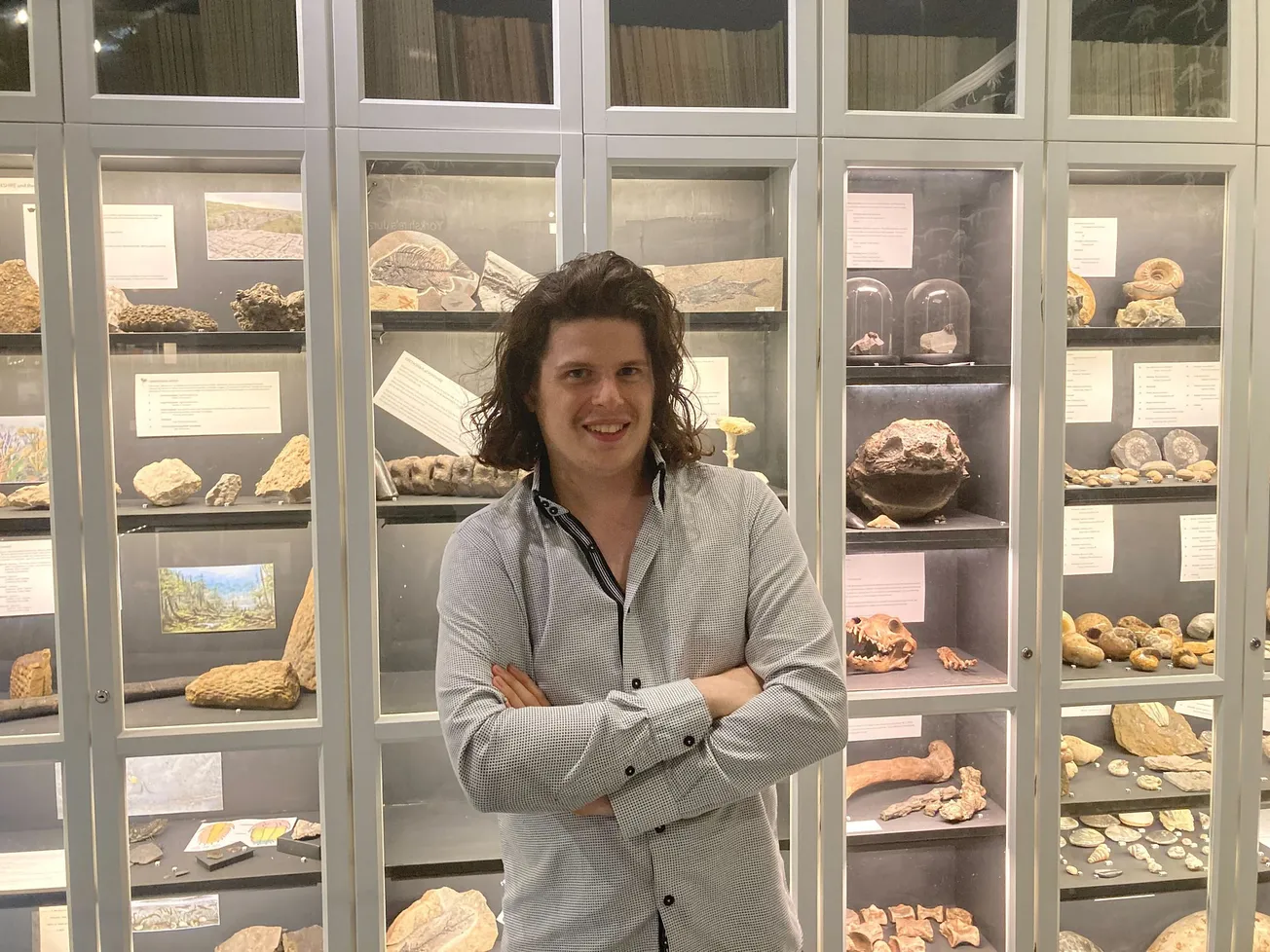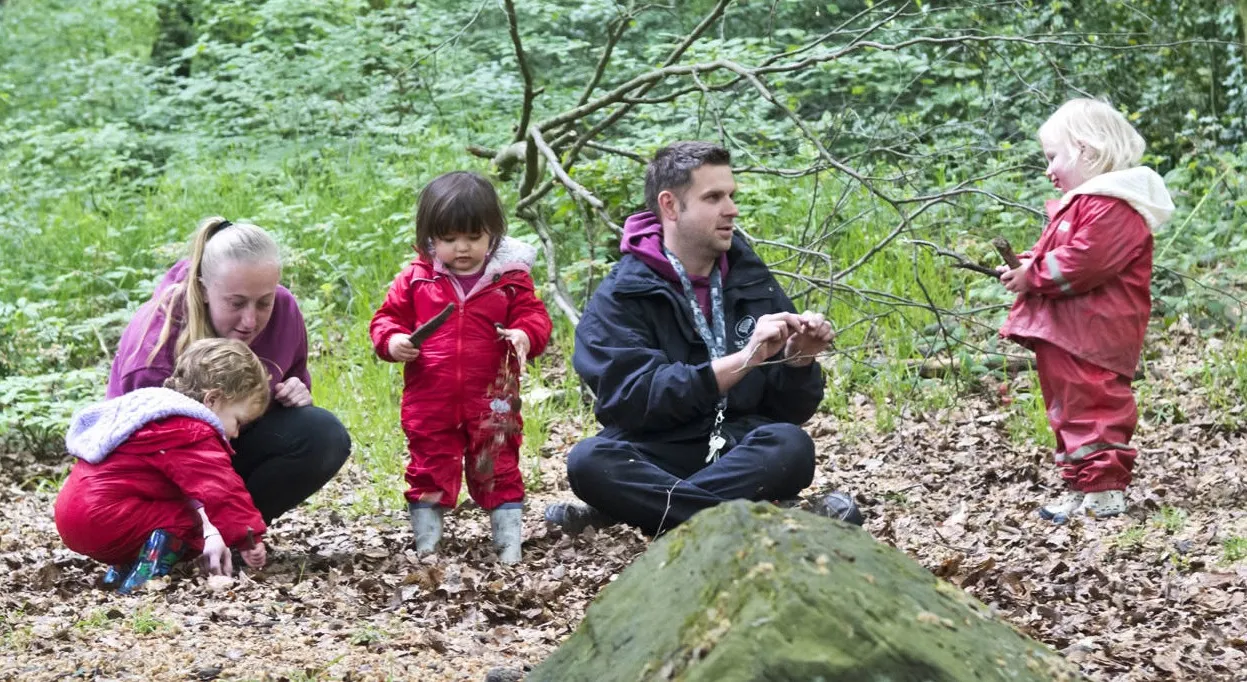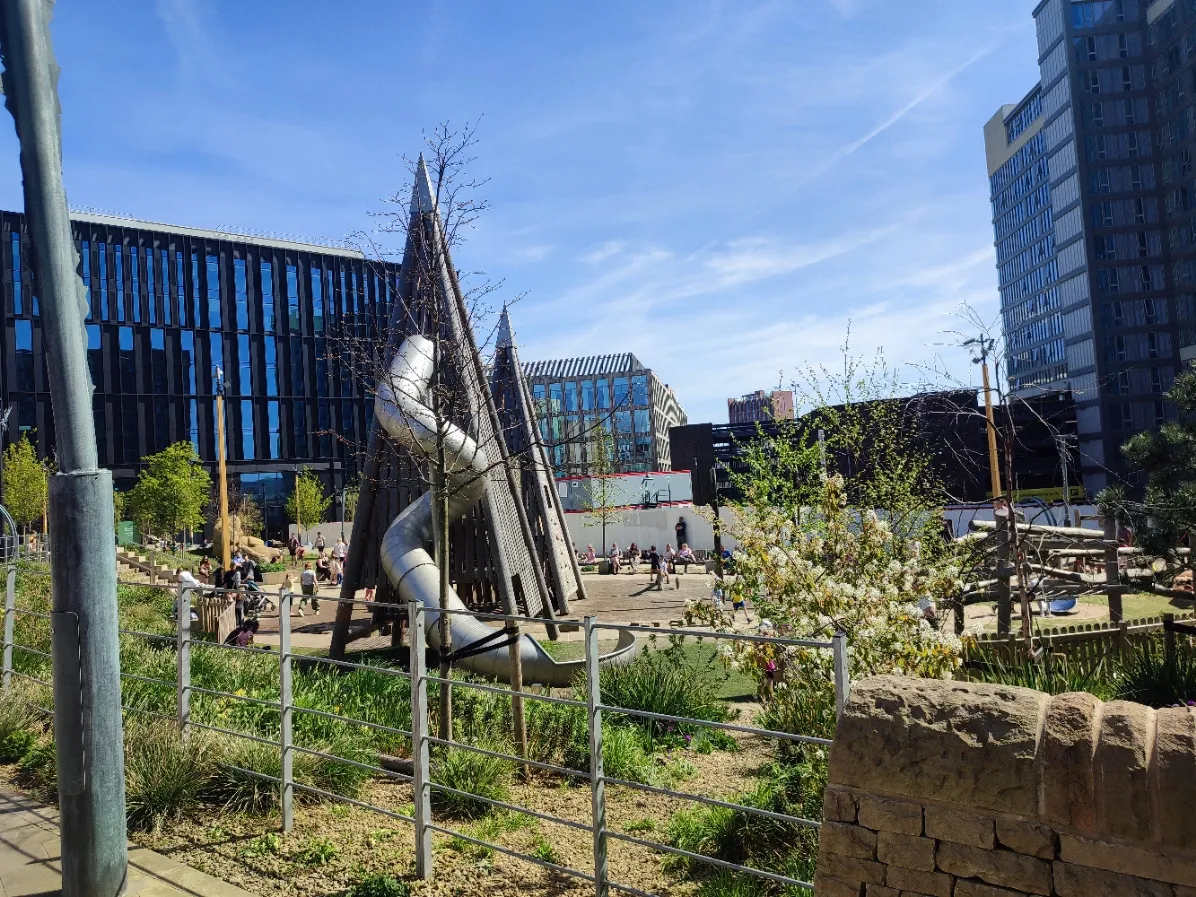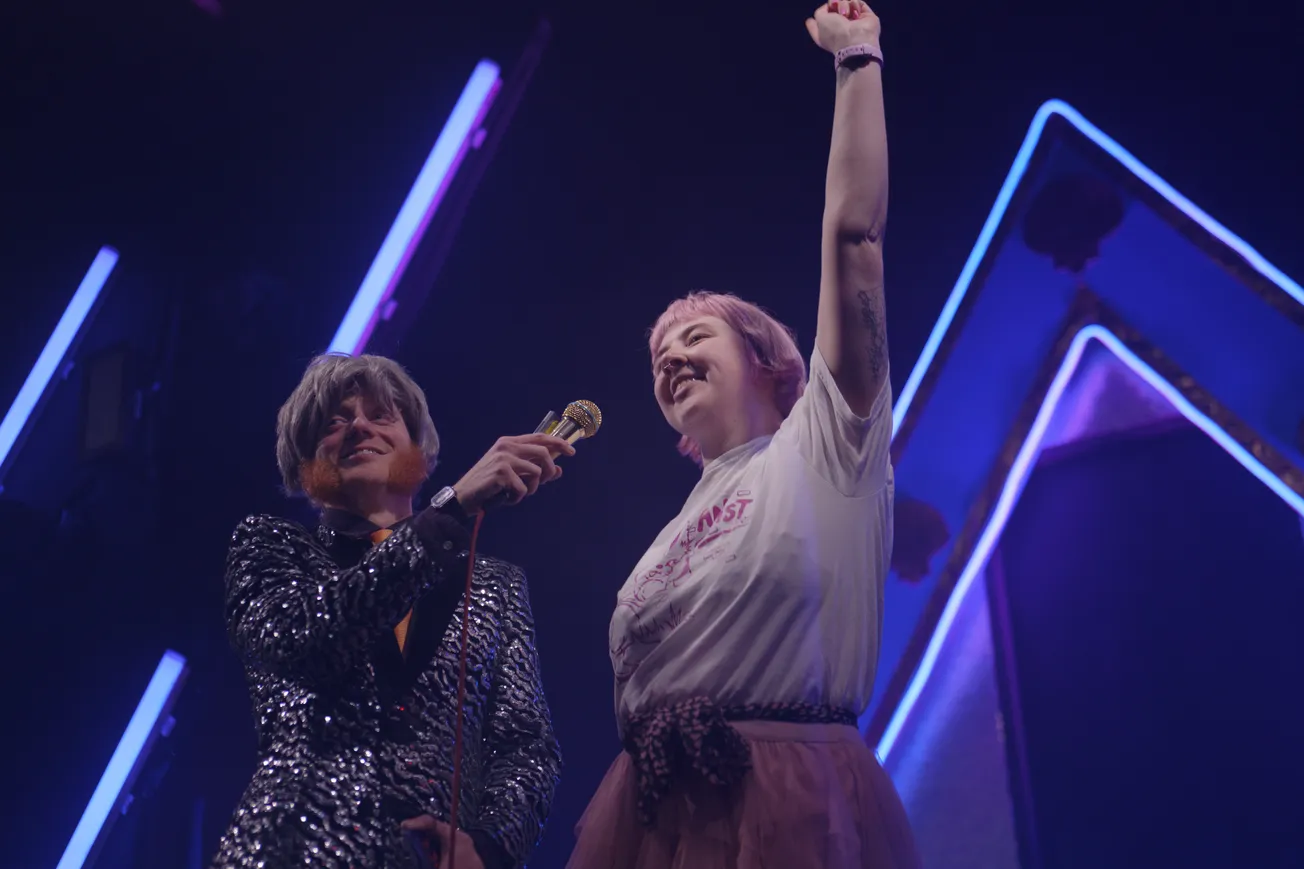It’s petty — his words, not mine — but it still frustrates James Hogg to this day that the Yorkshire Natural History Museum couldn’t open two weeks earlier than it did. The museum was only ready to welcome its first visitors, in mid-August two years ago, ten minutes before they walked through the doors, since the glass for the display cabinets had only arrived that morning. If not for this hiccup, James could have successfully opened it just before his birthday, at the age of 22 rather than 23.
I invite you to pause for a moment and think back to what you were doing on the cusp of your 23rd year. In my case, I was waitressing, terribly, at a Sri Lankan restaurant near my childhood home, which paid in cash. My job there was only secure because I was the sole employee that was (a) allowed to work in the UK, (b) not openly conspiring against the owner and (c) tall enough to wash the windows.
Comparison may be the thief of joy, but it’s also a pretty natural reaction in the face of something impressive. Even James, it seems, isn’t immune. The significance to him of opening a museum at 22 is that this is the age that Lionel Walter Rothschild, a British banker and zoologist born in the 19th century, started the collection that became the Natural History Museum at Tring. While not exactly a hero, it’s clear James views Rothschild as something of a kindred spirit. Like him, Rothschild had a background in finance and an enduring passion for the natural world, although there is one significant difference. “I would certainly like his wallet,” James jokes.

Though James, now 24, says he always dreamed of opening a museum, it wasn’t always the plan for his career. As a teenager, he briefly imagined he would become a banker, which is why he studied economics at the London School of Economics. However, after moving from Sheffield to the capital, he found himself much more compelled by the city’s museums than its financial district. It was disheartening to think that many of those back home might never get to enjoy these institutions, not because the cost of entering them was too high, but because the journey down to London was too expensive. He started dreaming of creating a local alternative, something much more accessible. “I’m a proud Yorkshireman, so it seemed the right thing to do.”
He had already realised by this point that, despite a “nerdy interest” in economics, working in finance wasn’t going to be enough to occupy him. He does think bankers provide a useful service, he says, but “there’s more to life than filling your own pockets.” He would need a higher purpose, one that benefitted other people, to feel satisfied. The purpose he has landed on — his “macro-goal” as he calls it at one point — is to create a “permanent home in the north of England for the natural sciences to be studied, viewed and held for long-term benefit”. It is, he says, how he plans to spend the rest of his life.
Though James says he has had an interest in natural history and palaeontology since childhood, he also seems to have been interested in basically everything — from the sciences to the arts and humanities. In a parallel universe, perhaps another version of James has opened a museum dedicated to something else. What launched him down the path he is on now, during his first year at university in 2015, was the release of Jurassic World, a blockbuster followup to the original Jurassic Park films.

Seeing this movie in theatres “reignited the spirit” of palaeontology within him, James says. “I wouldn’t really say the movie itself was all that inspiring,” he adds, although he finds it a bit silly when people are enraged by its scientific inaccuracies, “but something clicked while I was watching it.” Within months, he had decided he “might as well research the entire industry” of fossil collection and preservation. He directs my attention to a bookcase on the other side of his office, where he has the catalogues of “most palaeontology organisations in the western hemisphere”.
However, he didn’t set out to create a museum straight away. First, he would need to find a way to make enough money to support it. In a move that married his reinvigorated passion for palaeontology with his more recent interest in economics, James identified a gap in the fossil market that a new business venture could fill.
While lots of museums, universities and even private individuals have fossil collections, very few have access to facilities that could prepare their specimens, whether extracting them from surrounding rock or working to conserve them. Neo Jurassica, which originally operated out of a “lab” in James’ garden shed, was created to provide this service for relatively low rates. Since its inception, the company has worked with the Natural History Museum in London, the University of Birmingham and even a university in Japan, which curiously first reached out through Instagram. Many of its clients, however, are “independent individuals who have done quite well in life and become collectors,” James says. This company — founded in 2019, during James’ first year of university — now provides most of the museum’s day-to-day income, including funding a summer internship for budding palaeontologists.
In a way it’s unfortunate for James, who says he has little interest in himself, that he’s being interviewed by someone far more fascinated by him than the fruits of his labour. That isn’t to cast aspersions on the Yorkshire Natural History Museum, mind you, which I had a great time visiting even before I knew anything about its chairman. I even went back for Neo Jurassica’s two-hour “laboratory experience,” during which I tried (and resoundingly failed) to excavate my own ammonite fossil. But different people are fascinated by different topics. For James, it’s “deep time” and the wonders of the natural world — fossils mostly, although the museum also houses mineral and botany collections. For me, it’s people, particularly unusual people, and what makes them tick.

I know very little about James before we meet. He’s not interested in making a name for himself — in fact, he says, he’d be happy if his name was never attached to the museum at all — so the handful of interviews he’s given in the past have focused on the institution, rather than the man behind it. What these articles don’t really explore, and what first intrigues me enough to reach out, is the question of how someone could set up a museum in their early twenties.
It would be easy to assume that, like Rothschild, James is just a very wealthy man with a niche hobby. Collecting fossils is pretty popular among the 1%, with even celebrities like Leonardo DiCaprio dropping huge sums on dinosaur bones. Since opening the museum, James has been approached by someone working for a member of foreign royalty, who said their employer was willing to pay an immense sum for one of its rare specimens. (He politely explained that nothing was for sale.)
However, though James is happy to admit he didn’t have a deprived childhood — he cites this as one reason he’s now willing to work 15 or 16-hour days seven days a week, having effectively hit his leisure quota for one lifetime — he also doesn't seem to have been gifted the museum by his parents. Many of the private benefactors who helped it get going were actually close friends, since many of his old school friends now work in finance and are thus significantly better off. There was also more than two years of earnings from Neo Jurassica, which he founded at the age of 19.
At that age, James was two years too young to work as an Uber driver; was he a bit nervous about setting up his own company? “A lot of people say don’t run before you can walk and that’s very solid advice,” he replies, “but I like to run, fall over and keep pushing on.” Perhaps the fact I’m even asking this question is a little unfair. After all, people in their early twenties have been having children and fighting wars for most of human history.
It clearly annoys James at least a little when people try to reduce him to his age. “It will never get mentioned unless someone has a prior argument with me,” he says. “But, if someone is already on a path of disagreement, they will use it as a card in their wallet.” His comfort, on reflection, is that at least this is an obstacle that will go away on its own.
Still, I’ll readily admit I wasn’t the most dedicated student, but juggling a company with a degree? I'm getting exhausted just writing about it. James explains pleasantly that it was actually two degrees: his bachelors in economics and an MSci in data statistics and development policy with MIT, which he pursued alongside two qualifications in chartered investment and wealth management. Since then, he has collected even more qualifications — “I dare not think how many I have got” — and is currently working on a book.
At some point, he seems to spot the quarter-life crisis brewing behind my eyes and throws me a bone. "I think the best description is 'I'm sad'," he says, as in, profoundly uncool. So no trips to the pub after lectures then? No, he went quite a lot, he says. Even now, despite being even busier than he was then, he still manages to make time for his friends. Only the other day, for example, he used a spare hour between meetings, from 9 to 10pm, to play the fantasy-themed card game Magic the Gathering with a pal.
Does he sleep? Or is he a Maggie Thatcher type, snatching a few hours and then immediately returning to work? “Actually, I have trouble occasionally with lying in," he says. (Given he usually works from 9am until midnight, I suspect we have very different ideas of what constitutes a lie-in.) "I’m just efficient I guess," he shrugs. "I end up doing things and then things get done.” The journey from conceiving his museum to opening its doors to the public, for example, only took six months. “I knew the faster I got it done, the quicker people could come and take advantage of the museum.” Even his current partner, who he met when she started volunteering at the museum, became his girlfriend in a matter of days.

Despite my feeling that it's actually James who should be behind a display case somewhere, after careful dissection by scientists to find the source of his relentless productivity, it's worth talking a bit about the institution in question. The Yorkshire Natural History Museum, perhaps sharing its chairman’s self-effacing nature, hasn't invested a lot of energy in promoting itself thus far.
Like many visitors, I first stumble across it by chance. A friend has developed a crush on someone with a passion for fossils and, hoping to give her an excuse to strike up conversation, I search the internet for the phrase “Sheffield fossils” — and voila. Though it does strike me as unorthodox that a museum would be located in Hillsborough, at the very end of the tramline, it's not until I'm leading her through decidedly residential streets that I start to worry I'm taking her to a "museum" set up in someone’s front room.
It's not a front room — in fact, it's the former head office of a steelworks — although the entirety of the public-facing collection does fit into a single room at the minute. Overall, the museum is an odd mix of charmingly homegrown and surprisingly swish. The logo is nice enough that I wouldn't turn my nose up at one of the t-shirts in the gift shop, but the building is decorated with dinosaur wallpaper that I suspect was designed for a children's bedroom. James mentions having done a lot of the refurbishment himself, alongside other volunteers, after teaching himself DIY on the internet. This mostly worked fine, although he did accidentally install the wrong type of fire system for the building, which he had to rip out and redo. “I guess, like all young people, I sometimes assumed I knew more than I did,” he says. “It made me wiser, I learned to get professional advice rather than assuming the internet is correct.”
I find the museum charming but, at least for some, its slick branding and website creates an expectation its current facilities cannot meet. “One room with some fossils, it's not a museum by any sort of the imagination,” reads a critical review on TripAdvisor. “It took 10 mins to look round, and that included hopefully lapping the place looking for more rooms,” says another. James explains that the museum is on the cusp of moving into a "significantly bigger" site nearby and working on ways to liven up its exhibits, such as by introducing augmented reality glasses for visitors. “So you can look at a fossil and the animal comes to life,” he says.
Even in its current state, however, these critical voices are overwhelmingly drowned out by rave reviews. For those not put off by its small size, it seems the Yorkshire Natural History Museum has a lot to offer, often the enthusiasm of its staff and volunteers. Despite very little interest in fossils, I am entirely won over by the impromptu tour I receive from a man in a flat cap, who seems to possess both an avid passion for dinosaurs and a vague, clearly second-hand knowledge. “I’m told that this one…” is how most of his sentences begin.

Later I find out that this is James’ father, a man who has zero interest in fossils and rarely visits the museum. (He did once work as a door-to-door salesman; clearly his pitching skills have not waned.) It’s obvious James is touched that his father has retained enough information about the collection to show someone around. “He will have heard a lot from me,” he says, a little sheepishly. “If you’re passionate about something, you will be talking about it to those around you, whether or not they want to listen.”
When he was younger, people sometimes assumed James must have come from a family that put a lot of pressure on him to achieve academically. In fact, especially when it comes to his father, the exact opposite is true. While he’s certain his dad is “in the top percentile of IQ,” he left school in his teens to become a steelworker; James’ mother is the only other person in the family with a university degree. “He’d actively encourage me not to pursue anything academic,” James says, instead encouraging his son to start a company and make a comfortable living. His father would also try to bribe or cajole James into spending more time away from school work, going on holidays and taking breaks.
It’s fair to say this strategy massively backfired. Precisely because he had a very happy childhood, James says, “I don’t feel the need to keep fulfilling myself with holidays when I can be more productive.” He last went on holiday abroad six years ago and, during his one weekend off last year, decided to go fossil hunting in Dorset and acquire more specimens for the museum. “I don’t think work ever escapes my brain,” he says, “even when I’m relaxing it’s on my mind.” For him, this is just a natural consequence of feeling passionate about his cause. “If you know you have a purpose, the soul finds a way to devote its time to it.”
This consideration — where he should devote his limited time and, it seems, unlimited energy — is evidently one that weighs on James quite a lot. Prior to our formal interview, we first meet when I attend Neo Jurassica’s laboratory experience, in a side-room on the museum’s ground floor. It’s normally run by a lab technician but, on the day I visit, something has come up and no one but James is available. I am also the only attendee present. Given the chat we go on to have about his insanely busy schedule, I start to feel a little guilty at one point for dragging him away from his duties. Is he itching to get away?
Not at all, he insists, it’s actually quite nice. After all, it’s rare these days, with all the responsibilities running a museum entails, that he has much time to devote to the actual specimens it was created to house.

Comments
How to comment:
If you are already a member,
click here to sign in
and leave a comment.
If you aren't a member,
sign up here
to be able to leave a comment.
To add your photo, click here to create a profile on Gravatar.







